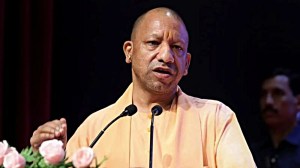Ustad in Valley with healing touch
For a while, ears used to the rattle of guns, grenade blasts and of course, cries of mourning were soothed by the notes of a legendary music...

For a while, ears used to the rattle of guns, grenade blasts and of course, cries of mourning were soothed by the notes of a legendary musician: a rare occasion in the Valley, when Ustad Bismillah Khan’s shehnai resonated in a Srinagar hall.
The Ustad had come for a special performance in Kashmir. And his shehnai was playing for the first time in a setting long steeped in the timbre of pain. Brought on a wheelchair to the stage last night, Bismillah Khan in his long white kurta and trademark cap projected an authoritarian presence, his half-lit face beatific in the encompassing darkness of the hall.
Chief Minister Mufti Mohammad Sayeed stood up in respect, so did everybody else. ‘‘The sur of Bismillah Khan has the potential to restore peace in the Valley,’’ the CM said. ‘‘Great music can overpower the cacophony of violence.’’
The Ustad played Raag Darbari to the intermittent beats of the tabla—by his son Ustad Nazim Hussain—and other instruments. But then, the start was not smooth, thanks a malfunctioning mike. ‘‘Who has installed this faulty mike? It interferes with my sur. They don’t understand what sur means,’’ he said, perhaps not realising that such functions are now so alien to the Valley where he had last performed in the 1960s.
Then, his music took over. Weaving intricate patterns, the shehnai notes turned sonorous, then receded to a fathomless depth, exploring and delving deeper in violence-scarred minds. To heal them. Every time the rhythm built up to an overwhelming crescendo, the audience broke out in a rapturous applause.
The ‘‘great spiritual experience’’, as pointed out in the beginning by Amitabh Mattoo, Vice-Chancellor of Jammu University, shaped up well, strain by strain, and was soaked up by the audience. ‘‘Bismillah Khan’s music evokes a world beyond caste, creed and colour,’’ said Mattoo.
Raag Darbari was followed by Kajri, a folk musical form, which tells about separation. The soothing notes, long melodic snatches of them, evoked poignant memories and acted as a balm. By now, the audience had become one seamless whole with the all-pervading symphony. Music had done its healing bit.
But for Ustad Bismillah Khan, music had potential for greater things. ‘‘Agar duniya main koi aman la sakta hai, to wo music hai (If anything can bring abiding peace to the world, it is music,’’ he said. ‘‘Music has no boundaries. And boundaries only divide.’’
For CM Mufti, the ongoing peace process between India and Pakistan had a role for people like Ustad Bismillah Khan. ‘‘They (great musicians), by their art, help us transcend our earthly selves and help us think as more compassionate human beings for the well-being of the world,’’ he said.
‘‘In Kashmir, we require them more. Their music is not only needed for healing. The ongoing peace efforts will also benefit by their involvement.’’
Photos


- 01
- 02
- 03
- 04
- 05





























